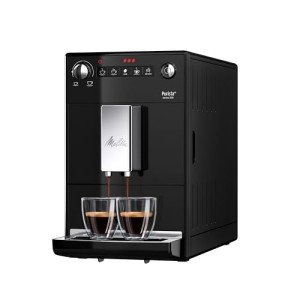Home Use Espresso Machines: A Comprehensive Guide
Espresso machines have become a staple in numerous households as coffee enthusiasts seek to replicate café-quality brews in the comfort of their kitchen areas. The rise in appeal has actually resulted in a varied market filled with different models, functions, and rates. This article intends to provide a helpful summary of home use espresso machines, assisting readers navigate their options successfully.
Understanding Espresso Machines
Espresso machines work by requiring hot water through finely-ground coffee under high pressure, leading to a concentrated coffee drink referred to as espresso. There are several kinds of espresso machines classified based on their brewing approaches and level of automation. The most typical types consist of:
- Manual Espresso Machines: These require the user to manage the pressure and water flow, permitting a more hands-on coffee-making experience.
- Semi-Automatic Espresso Machines: These use automatic control over water pressure, while the user by hand grinds and tamps the coffee.
- Automatic Espresso Machines: With the push of a button, these machines immediately manage the flow of water, making it simpler to brew espresso with consistent results.
- Super-Automatic Espresso Machines: These all-in-one machines deal with grinding, tampering, developing, and even milk frothing, making them perfect for users searching for benefit.
- Capsule or Pod Machines: These use pre-packaged coffee pods to create espresso with minimal effort, however they limit option in brewing strategies and flavors.
Table: Comparison of Espresso Machine Types
| Type | Control Level | Alleviate of Use | Cleaning up Level | Perfect For |
|---|---|---|---|---|
| Manual | User-controlled | Moderate | High | Coffee purists |
| Semi-Automatic | Partial automation | Moderate | Moderate | Home baristas |
| Automatic | Totally automated | Easy | Low | Busy individuals |
| Super-Automatic | Completely automated | Very simple | Very low | Convenience candidates |
| Capsule/Pod | Completely automated | Very simple | Really low | Casual drinkers |
Key Features to Consider
When choosing a home use espresso machine, it's important to consider numerous functions that can considerably affect the quality of espresso and user experience.
- Pressure: Look for machines that provide at least 9 bars of pressure, as this is thought about optimum for brewing espresso.
- Boiler Systems: Single vs. dual boiler systems identify temperature level stability and the ability to brew espresso and steam milk simultaneously.
- Grinder: Integrated grinders permit freshly ground coffee, which improves taste. Consider machines with adjustable grind settings.
- Milk Frother: For those who take pleasure in coffees and lattes, an integrated steam wand or automatic frother is crucial.
- Size and Design: Consider your cooking area area and aesthetic choices. Machines can be found in numerous sizes, from compact to big setups.
- Cost: Home espresso machines can vary from a few hundred to several thousand dollars, so it's essential to develop a budget before exploring choices.
Benefits and drawbacks of Home Use Espresso Machines
| Pros | Cons |
|---|---|
| Convenience of brewing coffee in your home | Initial investment can be high |
| Quality of espresso is typically superior | Needs some skill, specifically with manual machines |
| Ability to explore flavors | Upkeep and cleansing can be labor-intensive |
| Can conserve money in the long run | Not all machines will fit every coffee choice |
Upkeep and Cleaning Tips
Preserving an espresso machine is important for lengthening its life and ensuring consistent brew quality. Here are some beneficial pointers:
- Regular Descaling: Minerals from water can develop in the machine. Home Espresso Machines -3 months, depending upon water firmness.
- Daily Cleaning: Rinse portafilters, baskets, and steam wands after each use to avoid coffee oils from developing residue.
- Use Filtered Water: This can help reduce mineral buildup and improve the taste of coffee.
- Replace Gaskets and Seals: These components may wear over time and must be changed to maintain pressure and performance.
- Read the Manual: Each machine has specific care directions; following these will make sure longevity.
Frequently Asked Questions About Home Use Espresso Machines
Q1: What is the best budget espresso machine?The best budget espresso machine frequently depends on private needs, but designs like the DeLonghi EC155 or the Breville Bambino are popular amongst users for providing terrific worth. Q2: How long do home espresso machines usually last?With correct maintenance, home espresso machines can last anywhere from 5 to 15 years, depending on the quality of the machine and frequency of use. Q3: Can I make cappuccinos and lattes with any espresso machine?While most espresso machines can make coffees and lattes, having a trustworthy
steam wand or frother is vital for attaining the best milk texture.
Q4: Are super-automatic machines worth the investment?For those who focus on benefit and fast developing, super-automatic machines can be worth the financial investment, though they may lack some customizability in brew strength and taste. Q5: What types of coffee beans are best for espresso?While personal choice contributes, beans labeled as" espresso "blends are typically roasted darker, developing rich flavors and a velvety texture when brewed.
Investing in a home espresso machine can transform the daily coffee regimen into something special, elevating home brews to café quality. By understanding the various kinds of machines, key features to consider, upkeep needs, and weighing the
pros and cons, consumers can make educated decisions that match their individual choices. As the espresso culture continues to grow, no matter the choice, every brew can be a scrumptious experience waiting to be appreciated.

